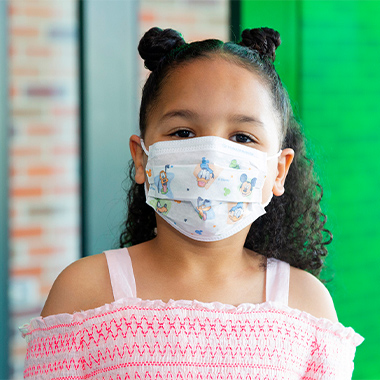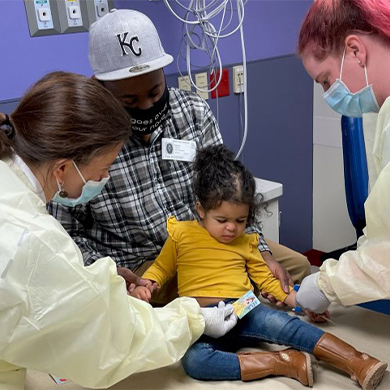Rangaraj Selvarangan, PhD, BVSc, DABMM, FIDSA, FAAM
William R. Brown, Missouri Endowed Chair; Division Director, Emerging Infections, Children's Mercy Research Institute; Director, Microbiology & Virology Laboratories; Professor of Pathology, University of Missouri-Kansas City School of Medicine; Clinical Professor of Pathology, University of Kansas School of Medicine
Full BiographyAs new diagnostic tests and treatments for infectious diseases rapidly emerge and evolve, ensuring that infected children receive the most appropriate treatment at the right time and for the right reasons is more critical than ever. A group of like-minded scientists at the Children’s Mercy Research Institute is taking on this challenge through a unique and innovative research coalition with one mission in mind—to protect children from infectious diseases.
The Pediatric Research in Infectious Disease, In Vitro Diagnostics and Epidemiology (PRIDE) Collaborative is a partnership among investigators in the Department of Pathology and Laboratory Medicine and the Division of Infectious Disease.
The PRIDE Collaborative is led by Rangaraj Selvarangan, PhD, who came to Children’s Mercy nearly two decades ago to run the hospital’s Clinical Microbiology Lab, testing samples for bacterial, viral, fungal and parasitic infections.
“I realized there was a unique opportunity to conduct cutting-edge clinical testing, which requires us to continuously evaluate and reevaluate what we do,” says Dr. Selvarangan, who now serves as director of Clinical Microbiology & Virology Laboratories and the research director of Laboratory Medicine at Children’s Mercy. “Because the diagnostic market for infectious disease testing is constantly changing with new methods and techniques, I wanted to find a way forward to evaluate infectious disease testing and select the best tests for patient care.”
That way forward led to the PRIDE Collaborative, which integrates basic and translational research in infectious disease to ultimately help point the way to improved treatments, treatment regimens, and diagnostic testing. In addition to Dr. Selvarangan, investigators in the PRIDE Collaborative include Liset C. Olarte Carhuaz, MD, Jennifer Schuster, MD, Susana Chavez-Bueno, MD, from Division of Infectious Disease and Dithi Banerjee, PhD, from Department of Pathology and Laboratory Medicine. Bishnu Adhikari, PhD, a previous member of Children's Mercy's Department of Pathology and Laboratory Medicine, had also been a member of the PRIDE Collaborative.
Together, the members of the PRIDE Collaborative are leading pediatric infectious disease epidemiology and outbreak investigations through the Kansas City-New Vaccine Surveillance Network (KC-NVSN). Funded by the Centers for Disease Control and Prevention, the program has been performing population-based, laboratory-confirmed active surveillance of acute gastroenteritis and acute respiratory illness in children seeking care at Children’s Mercy since 2009.
The PRIDE lab collaborative brings scientists together with one major focus in mind, and that is to identify early signals of infectious disease outbreaks, detect and track the pathogens using accurate test methods and identify better control and prevention measures to protect children and promote their wellbeing.
A recent $7.25 million grant award from the CDC will allow the team to expand the KC-NVSN research program to other areas in the Kansas City metropolitan area. In addition, samples collected from children with vomiting, diarrhea, or respiratory illnesses, are tested to identify viruses such as rotavirus, influenza and SARS-CoV2 and to compare children’s vaccine records to determine how effective the vaccines they received are in protecting them from circulating viruses. Additional viruses such as RSV and norovirus are detected to evaluate the burden of the disease in children to inform control and prevention measures.
Other lines of research undertaken by PRIDE Collaborative investigators have focused on areas such as pneumococcal infections and colonization, E. coli infection, antimicrobial resistance, rotavirus, influenza, and COVID-19, specifically the impact of severe COVID-19 infection in children, the effect of age on COVID-19 symptoms, the long-term effects of COVID-19 in children (in collaboration with colleagues at Rutgers University), and other COVID-related research projects.
“The PRIDE lab collaborative brings scientists together with one major focus in mind,” says Dr. Selvarangan, “and that is to identify early signals of infectious disease outbreaks, detect and track the pathogens using accurate test methods and identify better control and prevention measures to protect children and promote their wellbeing.”



